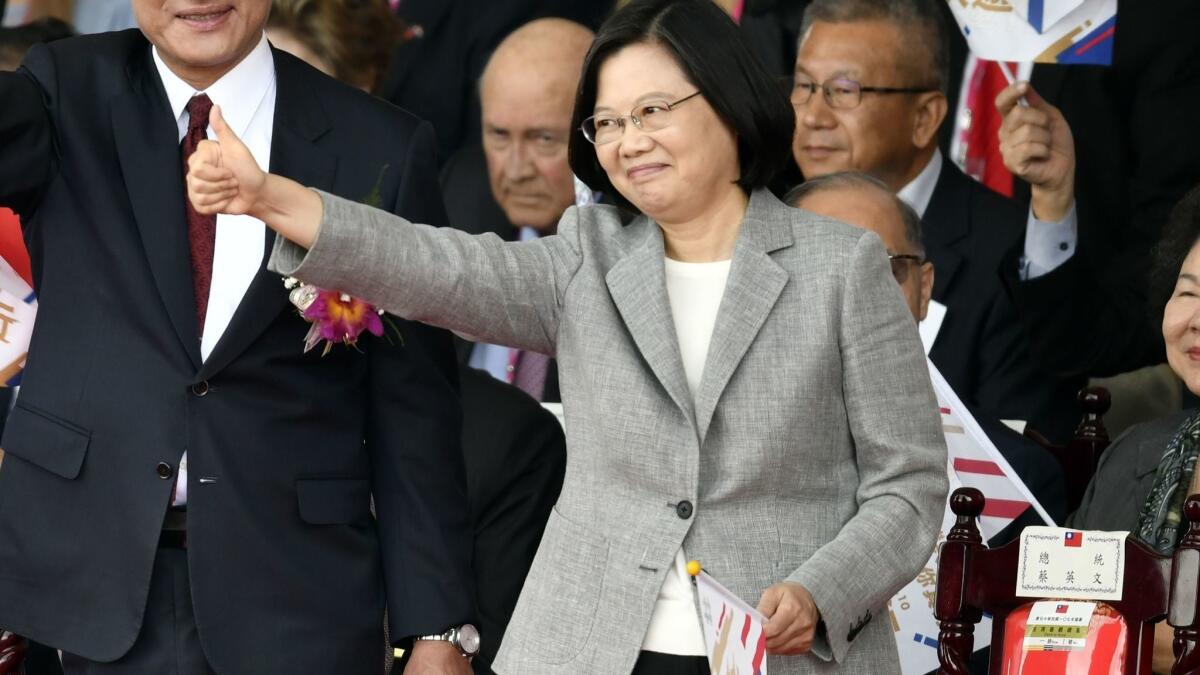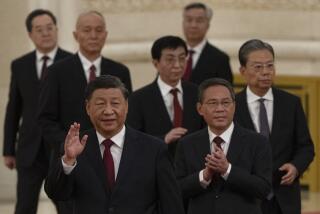Taiwan president vows not to back down as China raises the pressure on island state

- Share via
Reporting from Taipei, Taiwan — Taiwanese President Tsai Ing-wen on Wednesday accused China of ratcheting up military and diplomatic pressure on her self-ruled island, adding another layer of tension to the worsening relations between Beijing and an island it considers a breakaway territory.
She also vowed that Taiwan would resist any effort by China to unify the two sides and that the island state would invest more in its military, thanks to support from the U.S. and Japan.
Tsai made her remarks during a televised speech on Taiwan’s National Day. There was no immediate response from China.
“For some time now, China’s unilateral diplomatic offensive and military coercion have not only harmed cross-strait relations, they have also seriously challenged the status quo of peace and stability,” Tsai said.
Beijing wants Tsai to come to the bargaining table, but with the condition that Taiwan accept that China and the island are a single country. Although her predecessor, Ma Ying-jeou, signed more than 20 agreements on investment, trade and tourism after accepting such a condition, Tsai has refused and instead has pushed for Taiwanese autonomy. Government polls in Taiwan show overwhelming support for autonomy.
In recent months, the provocations between the two have spilled into public view.
Chinese military aircraft periodically fly near Taiwan and aircraft carriers ply the waters off its shore. In July, Taiwan welcomed the presence of U.S. warships that defiantly moved through the Taiwan Strait. Meanwhile, China demanded that all commercial airlines stop referring to Taiwan as a nation.
China and Taiwan have also been locked in a diplomatic chess match as each seeks global support. Officials in Taipei say Beijing has pressured five of Taiwan’s diplomatic allies to switch their allegiance during Tsai’s presidency. Today just 17 countries, small and mostly impoverished, recognize Taiwan, compared with the 170 plus that recognize China.
Chipping away at Taiwan from another angle, in February Beijing unveiled a list of 31 measures that make it easier and more appealing for Taiwanese to invest, work and study in China. China is attractive with its $12-trillion-plus economy, more than 20 times the size of Taiwan’s.
Tsai vowed Wednesday to increase military spending every year on a “stable” track. “Our lean and combat-ready troops absolutely have the ability to defend Taiwan’s sovereignty,” she said. “In addition, we are also working to enhance our national defense self-sufficiency.”
Taiwan has seen a jump in favorable attention this year from the U.S., its staunchest informal ally. In her speech, Tsai noted that Vice President Mike Pence lauded Taiwan’s democracy while criticizing China in a speech this month.
Pence “openly condemned China’s suppression of Taiwan’s diplomatic efforts,” she said.
The Trump administration also has approved two Taiwan arms packages, and President Trump signed a bill encouraging high-level visits between the two. Japan has “spoken up” for Taiwan in international settings, and the European Union has formally recognized Taiwan’s “democratic development,” she said.
“In the last two years, facing pressure from China, Taiwan has upheld its values and beliefs, been extremely resilient, and therefore garnered the support of more and more like-minded countries,” she said.
But Taiwan-U.S. relations could cool rapidly if the China-U.S. trade dispute eases. Observers warn that Trump may only be using Taiwan as a game piece to pressure China over trade.
“Taiwan can sometimes be played as a leverage game diplomatically, but in substance, I just don’t see that the relationship between the U.S. and China would pay any special attention to Taiwan,” said Liu Yih-jiun, a professor of public affairs at Fo Guang University in Taiwan.
Tsai has also failed to counter Beijing’s powerful incentives for Taiwanese citizens to work, study and invest on the mainland, said Lin Chong-pin, a retired strategic studies professor in Taiwan.
“Definitely people think the economic lure from China to Taiwanese people has become irresistible, and there’s greater willingness for people to send children to be educated in China,” Lin said. “Has she addressed that? She has not.”
Jennings is a special correspondent.
More to Read
Sign up for Essential California
The most important California stories and recommendations in your inbox every morning.
You may occasionally receive promotional content from the Los Angeles Times.










